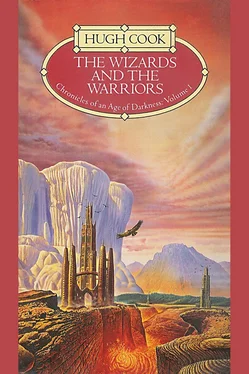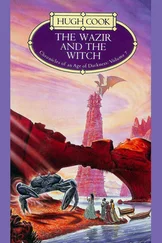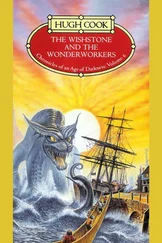Hugh Cook - The wizards and the warriors
Здесь есть возможность читать онлайн «Hugh Cook - The wizards and the warriors» весь текст электронной книги совершенно бесплатно (целиком полную версию без сокращений). В некоторых случаях можно слушать аудио, скачать через торрент в формате fb2 и присутствует краткое содержание. Жанр: Фэнтези, на английском языке. Описание произведения, (предисловие) а так же отзывы посетителей доступны на портале библиотеки ЛибКат.
- Название:The wizards and the warriors
- Автор:
- Жанр:
- Год:неизвестен
- ISBN:нет данных
- Рейтинг книги:5 / 5. Голосов: 1
-
Избранное:Добавить в избранное
- Отзывы:
-
Ваша оценка:
- 100
- 1
- 2
- 3
- 4
- 5
The wizards and the warriors: краткое содержание, описание и аннотация
Предлагаем к чтению аннотацию, описание, краткое содержание или предисловие (зависит от того, что написал сам автор книги «The wizards and the warriors»). Если вы не нашли необходимую информацию о книге — напишите в комментариях, мы постараемся отыскать её.
The wizards and the warriors — читать онлайн бесплатно полную книгу (весь текст) целиком
Ниже представлен текст книги, разбитый по страницам. Система сохранения места последней прочитанной страницы, позволяет с удобством читать онлайн бесплатно книгу «The wizards and the warriors», без необходимости каждый раз заново искать на чём Вы остановились. Поставьте закладку, и сможете в любой момент перейти на страницу, на которой закончили чтение.
Интервал:
Закладка:
Some sheltered city dweller might have been terrified by this change, but to Blackwood it did not seem unnatural. Living for years in the wild, he had developed his powers of observation so he could interpret the weather-signs by a single glance at the sky; after a moment's consideration, he could judge the age of track-signs and much of the nature of the animal which had made them; navigating without maps and sleeping in the open had taught him a keen appreciation of the landscape he moved through.
In the days when he had dared the unfamiliar territory of the Penvash Peninsular, he had been able, without conscious effort, to look at a range of hills and identify the slopes that would give the easiest approach to the main ridge line, and those gullies and ravines where water was most likely to be found.
Heightened powers of empathy with the landscape did not trouble Blackwood, but he was disturbed by similarly heightened perceptions of people – particularly when he saw the hackiron hatred with which Elkor Alish regarded Morgan Hearst.
Yet if Alish was disfigured by hatred, he was nevertheless amazing to watch for he brought such physical grace to everything he did. Training with a sword in the evening, an ardent spirit matching total concentration and total commitment to perfect economy of effort, he revealed a matchless capacity for joy in performance.
Watching him, Blackwood sensed how Alish felt in those moments of perfection: like a god, buoyed up by limitless possibilities. Yet dedication was not matched by wisdom, for this mastery of the potentials of flesh and steel was entirely self-involved; the discipline served to preserve the warrior's inner being, denying change, allowing a fanatic hatred to survive for years without nourishment.
This was a man who denied himself change. Matchless energies, essentially joyful and godlike, were warped to the service of narrow disciplines which preserved an earthbound hatred. Blackwood saw this, and also saw that there was no way for an outsider to change the man without destroying him, for his hatred was not an expendable excrescence like a wart – it was part of the complexities of the inner fabric of the man.
Yet if, one day, Elkor Alish were to find a way to choose to change, then perhaps he might become a perfect manifestation of something which Blackwood soon came to think of as the flame of life. To varying degrees, he saw this flame in each of them: Hearst, Alish, Gorn and Garash. What he saw was the beauty of the vitality which graces every human life.
Blackwood was no mystic; he had no desire to see visions. He repeatedly told himself that it was all delusion, that the dragon's blood was working on him as liquor works on a drunkard, distorting the way in which the world is seen.
Yet in the end he had to admit that he saw something which was really there to be seen. For he could remember a day – long ago now – when he and Mystrel had walked together in Looming Forest, in spring:
Sky, blue sky, the colour of my lover's eyes; Leaf, young leaf, her hands no softer.
Blackwood had been in love that day, not only with Mystrel but with all the world. It had only been for a day, or perhaps only for a single morning, but in that time he had seen the flame of life which is in all things. Now he saw it from moment to moment, day after day.
One may survive occasional visions. From old memories inherited from the wizard Phyphor, Blackwood knew the poet Saba Yavendar had spoken of such visions. But Saba Yavendar had seen them only now and then: he had been able to make his peace with the world in which he lived, as evidenced by his ability to write a paean of praise for bloody slaughter, the song of the Victory of the Prince of the Favoured Blood, which Hearst had recited in the High Castle in Trest.
How could Blackwood live constantly with such visions? He knew that if he ever had to raise his hand against another man, he would be unable to do it. How could he bear to take a blade and destroy that flame of life? Yet if he could not defend himself when the need arose, sooner or later he would meet his death, and probably sooner rather than later.
A saint might, perhaps, have welcomed such visions – but Blackwood was no saint. In a hard and often bitter life, Blackwood had, by suffering, learnt to live with the realities of the world. Now, for him, the realities had changed, and it seemed he must go through all that suffering again.
After marching across leagues of monotonous flat lava country, in which there was no drinkable water, they passed between the blue lakes. The water, heavily contaminated with sulphuric acid, was a deep, unnatural blue, and Blackwood cautioned against drinking it.
North of the blue lakes, the volcanic nature of the terrain was less pronounced; the going became easier. They thought they might be clear of the dragon country – then they came upon a clutch of dragon eggs. Gorn attacked one of the eggs, smashing and battering at it until he was gory with yolk and white. Hearst stopped him from damaging the others.
Nearby was a pool of boiling water, seething with steam and fury. It bubbled and tumbled, never still, never silent. Hearst had one of the man-high eggs rolled into the pool. Then another. Then a third. The eggs bobbed up and down in the boiling water. One cracked; white stuff forced its way out, hardening in the water into fantastic forms like mould and fungus.
The eggs, when cooked, were good eating, though between them the humans could not consume a single egg entire. Gorn dipped his helmet into the boiling water, and when the contents cooled he washed himself as well as he could. But they could not spare the time for Gorn to cool enough water to wash himself properly, and so he stank of dragon's egg for the next two days, until their march took them to one of the tributaries of the Amodeo River.
The tributary offered them a route north through the Broken Lands and then through the Dry Forages to the city of Kalatanastral. They had no boat, and there was no timber in that country, but reeds grew by the riverbanks, and, at this end of summer, the low water level made it easy to gather the reeds.
An expert can fashion a one-man reed canoe in a single day, but these amateurs were three days making their little flotilla. Then they set forth on the slow-flowing muddy waters; the windings of the river meant that their first day's journey took them toward the west, although ultimately the waterflow would swing to the east, bearing them toward the eastern coast of the continent of Argan.
Their journey took them through lands which legend held to be uninhabited and uninhabitable, but clearly the legends were wrong. On some days, they saw signal fires burning to east or to west. Once, they passed half a dozen lean-to shelters, primitive windbreaks built for a transient camp then abandoned.
The country downriver was flat and monotonous, with sparse grazing, yet they saw, once, in the distance, the dust of a herd of animals on the move; the distance was too great for them to determine what the animals were, and the Rovac warriors resisted the temptation to trek inland for some hunting – they could not afford such frivolities.
They had no need to leave the river to search for food, because it afforded them a sufficiency in the form of eel and water-rat, frog, carp and heron. Their evening hunting was done with sharp skewering stakes, fire-hardened spears or stones flung from improvised slings; the fishing was good.
Yet they saw no human beings until, one day, they saw a stranger some distance downriver, riding an animal of some description. i hope the natives are friendly,' said Hearst. if not,' said Garash, only half in jest, i claim the kidneys. I could do with a change in diet.' iil fight you for them,' said Gorn, not joking at all; he liked kidneys.
Читать дальшеИнтервал:
Закладка:
Похожие книги на «The wizards and the warriors»
Представляем Вашему вниманию похожие книги на «The wizards and the warriors» списком для выбора. Мы отобрали схожую по названию и смыслу литературу в надежде предоставить читателям больше вариантов отыскать новые, интересные, ещё непрочитанные произведения.
Обсуждение, отзывы о книге «The wizards and the warriors» и просто собственные мнения читателей. Оставьте ваши комментарии, напишите, что Вы думаете о произведении, его смысле или главных героях. Укажите что конкретно понравилось, а что нет, и почему Вы так считаете.












